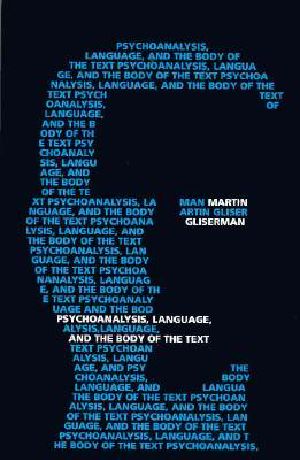Psychoanalysis, Language, and the Body of the Text

- Authors
- Gliserman, Martin J.
- Publisher
- University Press of Florida
- ISBN
- 9780813014166
- Date
- 1995-12-19T00:00:00+00:00
- Size
- 0.44 MB
- Lang
- en
"Offers its readers stimulating cross-disciplinary perspectives on a variety of literary works and enables each of them to spring to life anew. Its manifest aim, the desire to integrate corporeal and cultural experience in original ways, seems right on target for the nineties."--Ellen Handler Spitz, author of Image and Insight and Museums of the Mind
"A major scholarly contribution which will alter and extend the received understanding of the history of the novel."--Peter Rudnytsky, University of Florida
The growing field of "body studies," which examine the relationship between corporeal experience and the mind, includes scholars from the areas of psychological literary criticism and semiotics as well as psychoanalysis and gender studies. Combining contemporary linguistics and psychoanalysis, this work focuses on how the body emerges in the novel. In particular, it looks at the role that language plays in integrating the body and the mind.
By drawing on language theory forged by Noam Chomsky and on the body awareness articulated by Sigmund Freud and others, Martin Gliserman discovers that the presence of the body is the core phenomenon of the novel. He scrutinizes the syntax of the novel's text (the arrangement of words in sentences, paragraphs, and chapters) as bodily gestures in a range of works that include erotic novels as well as those with themes of violence. Concentrating on primal bodily pain, he examines four novels chosen to span the issues of history, gender, and race: Daniel Defoe's Robinson Crusoe, Charlotte Bronte's Jane Eyre, Virginia Woolf's To the Lighthouse, and David Bradley's Chaneysville Incident. In each he reveals a primitive body fraught with desire that is distorted by fear, pain, and conflict.
For Gliserman, words have a double life--they generate and fulfill our narrative lust; they also "live in another (deconstructed, synchronic, slipped) universe of discourse." In this work he unlaces language from the body and discovers a common, existential flesh.
Martin J. Gliserman is associate professor of English at Rutgers University and a psychoanalyst in private practice. He is the editor of American Imago: Studies in Psychoanalysis and Culture and has published articles in Modern Psychoanalysis, Jump-Cut, College English, and other journals.